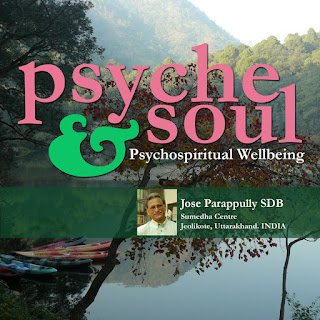Jose Parappully, Salesian priest and clinical psychologist, and Director of Sumedha Centre for Psychospiritual Wellbeing at Jeolikote, Uttarakhand, presents every weekend starting this July a psychospiritual and educational reflection titled “Psyche & Soul.” on Bosco Information Service (www.donboscoindia.org) In these reflections he uses insights from psychology, sacred scripture as well as the socio-political realities of our everyday life to help us enhance our emotional wellbeing and our spiritual life – our psyche and our soul.
In this first reflection he focuses on health and happiness – our psycho-physical and spiritual wellbeing.
.....
Let me begin with a question: What is it that contributes to health and happiness the most in the later years of life? …..
The answer to this question is something that psychology has been searching for years. The answer is now clear, with conclusive data from research.
It is our satisfying and fulfilling close relationships (friendships, marital relationships) in the earlier years that lead to health and happiness in the later years of life.
Research after research has been reaching the same conclusion. Let me cite the most famous of them all.
The Harvard Study of Adult Development, known as the Grant Study, is perhaps the longest running longitudinal study ever. A longitudinal study is one that follows up the same group of people over many years. The Harvard study, begun in 1938, followed up two groups of people, one 268 students from Harvard University, coming from the privileged affluent class and the other 456 young men from Boston’s poorest families. Around 70 of these men are still alive, and are still being studied.
These men were followed year after year, now for over eighty years – with questionnaires and interviews, psychological and medical tests that collected every kind of data. Painstaking analysis of all these data led to several significant conclusions regarding physical and emotional wellbeing .
In a recent TED presentation entitled “The Good Life” Dr. Robert Waldinger, the current and fourth Director of the Study, declared that the Grant Study provided conclusive evidence to show that it is our close relationships that lead to health and happiness.
Those with the most satisfying relationships in the earlier years were the happiest and healthiest in their 70s’s and 80’s. Those who were isolated from others, who had no friends or satisfying marital relationships, were less happy and less healthy.
A second clear message delivered by the Study, Waldinger observed, is that it is the quality of close relationships, and not the number of relationships that matter. Having a few really good close relationships contributes more to health and happiness than several not so close or healthy ones
.
Waldinger’s predecessor, Dr. George Vaillant, published four books based on the findings from the Study. In them Vaillant had already confirmed what Waldinger found. It is our close relationships that really count. I quote: “Warm, intimate relationships are the most important contributing factor in the establishment of a good life.”
The capacity for close relationships, in turn, depended significantly on the warm relationships the men in the study had experienced with their parents, siblings and other significant people in childhood. A loving and cohesive home environment had a profound impact on life satisfaction in adult life.
Vaillant’s five-word final conclusion: “Happiness is love. Full stop.” That’s it, “Happiness is built on love.”
…….
Jesus had said this many years ago. “Love one another,” he had said. That’s the only thing that really matters.
Happiness, according to Jesus, results from loving one another, caring for one another, forgiving one another. The good life according to Jesus is founded on a society where justice, peace and harmony prevail, where everyone treats one another, irrespective of class, caste, religion and ethnicity as sons and daughters of the same loving God…
The situations in contemporary society, torn apart by dissension and hatred, invite us to give greater consideration to these values essential for health and happiness.
It might be helpful for us to take a few moments, in the context of this reflection, to consider the quality of our relationships, the way we treat one another.
Here are a few questions for us to stay with as we conclude:
Are the insights from the Grant Study and Jesus’ teaching on relationships challenging us in anyway?
How can we enhance love in our relationships? ….. Is there any particular relationship to which we have to bring some changes to make it more loving?
Is there anything God is telling us in regard to our relationships?
We take a few moments to listen to the Spirit within us and we respond in quiet payer, talking to the God who envelops us in love.
A n podcast based on this post is available at anchor Psyche--soul---health-and-happiness
……
God bless. Have a healthy and happy weekend enhanced by loving relationships.
Bye, till the next weekend.
Jose Parappully SDB, PhD
Director Sumedha Centre









No comments:
Post a Comment